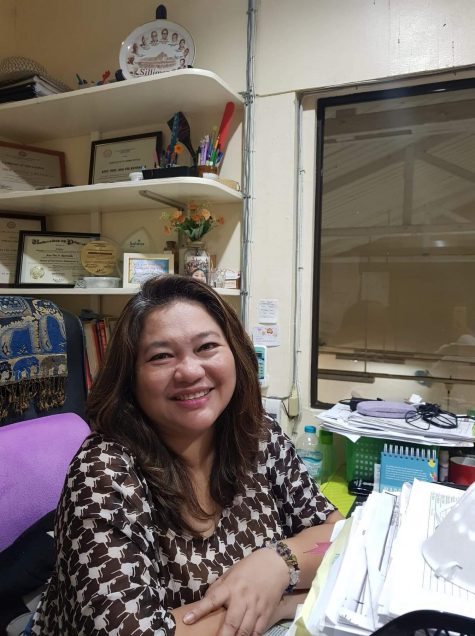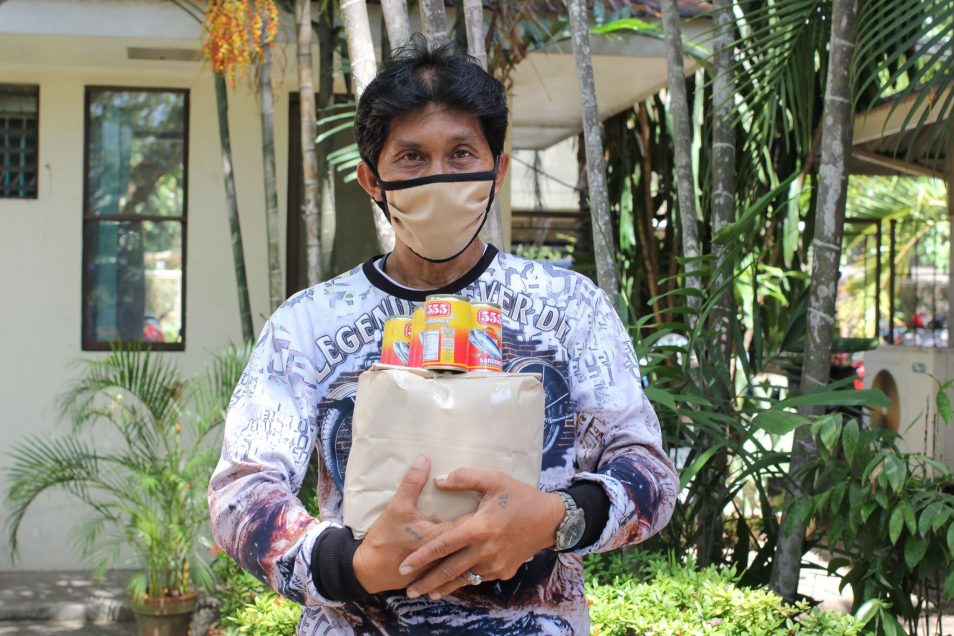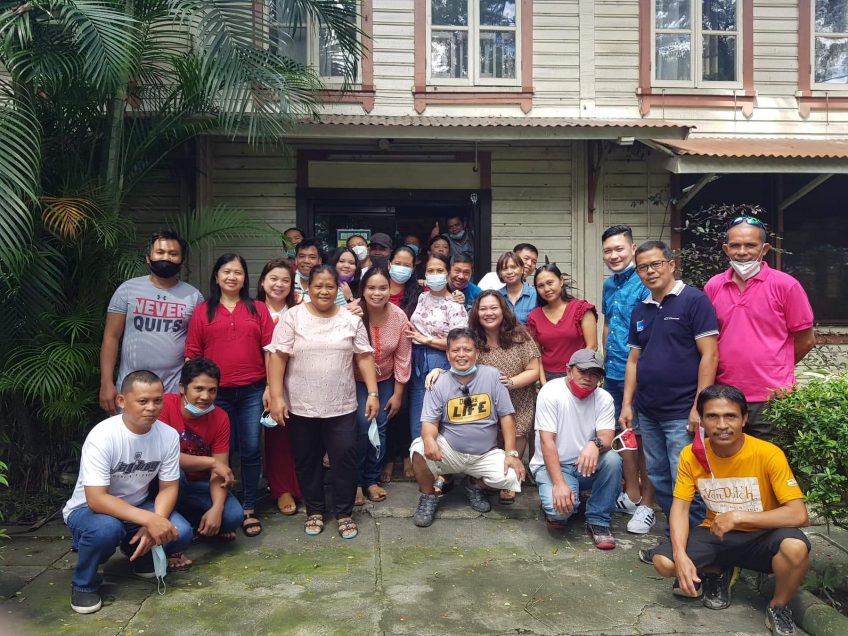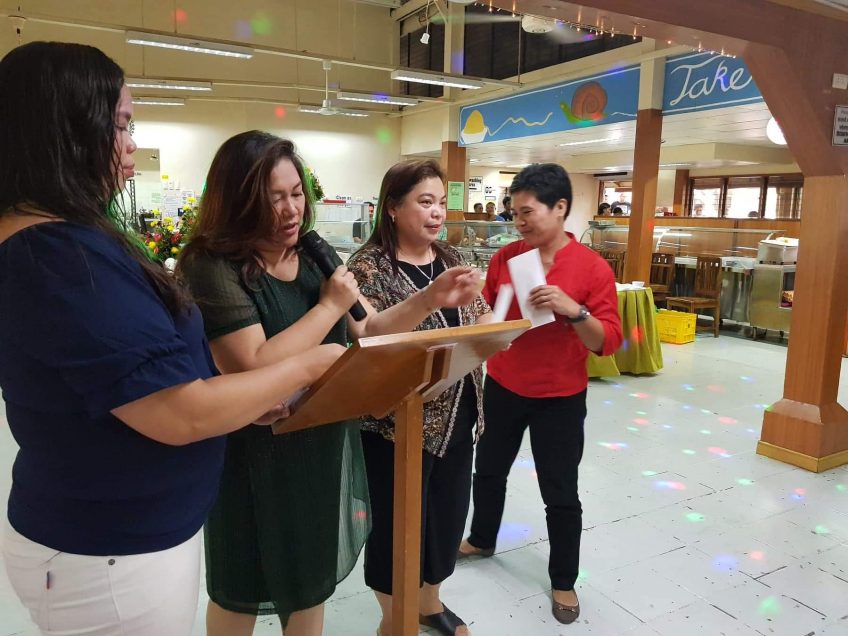Ana Vee A. Riconalla
#SUWomenLeaders Series for National Women’s Month 2021 – In celebration of National Women’s Month, Silliman University features its women leaders whose initiatives contributed to the University’s response to the COVID-19 pandemic and its effects on the community, and women who remain unstoppable in the face of the pandemic as leaders in their respective fields.

When areas of the country were simultaneously placed under Enhanced Community Quarantine (ECQ) in April 2020, including Negros Oriental, the restrictions it brought took a heavy toll on the most vulnerable communities. For a lot of Filipinos, especially those who lived paycheck to paycheck and those without a regular income, the ECQ was paralyzing. Many struggled to meet their basic needs, including the most basic of all: food.
Among those whose livelihood was affected by the ECQ were the University’s outsourced personnel; those who work behind the scenes but are essential in the campus’ upkeep and day-to-day operations. During this time, SU made sure that they were not forgotten.

With the support of SU alumni and other friends of the University who made donations, SU was able to distribute food packs consisting of rice and canned goods to its displaced outsourced personnel in March, April, May, and June 2020.
The unit that mobilized this initiative is the Food Services Department (FSD), otherwise known as the SU Cafeteria, where Ana Vee A. Riconalla leads as its manager.
The FSD had a crucial role in the University’s efforts to cushion the pandemic’s effects on its immediate community. Despite the actual Cafeteria being closed last April and May, Riconalla and her team became busy as the University’s logistical arm in organizing its relief efforts.
Aside from the food packs for displaced outsourced personnel, the FSD also distributed meals to students who could not return to their hometowns during ECQ. This was an initiative of the Silliman Alumni Association-Dumaguete Chapter, whose members donated funds to help the stranded students.
In May 2020, the FSD launched the “Silliman Bayanihan on Wheels,” an initiative that provided free meals to 41 identified frontline workers in the Dumaguete area who are members of SUHS Batch ‘95.
To financially support the University itself, the FSD also rolled out the “Silliman Cafeteria on Wheels” in May. Riconalla said this was the Cafeteria’s adaptive response to the restrictions during the initial phase of the quarantine when dine-in options were not allowed, so food establishments had to find a way to bring their products to their customers.
With Riconalla’s leadership, the FSD enabled the University to mobilize its efforts in helping affected groups during the outbreak of the pandemic. At a time when bayanihan was needed the most, the FSD showed the importance of food assistance as a way of helping others survive a difficult time and as a way to represent the solidarity of the SU community in supporting those who needed help. The FSD also adapted more proactive strategies in its operations so that it can continue to support the University.
This is what happens #WhenWomenLead in Silliman University.
In the following interview with Riconalla, she talked more about the food assistance initiatives of SU during the outbreak of the pandemic last year. She also answered questions about herself as a leader, professional, and woman in light of National Women’s Month:
——————————————————————————————————————————
- Tell us about the food assistance initiatives of SU conducted last year. How and why was it initiated? How did it turn out and what kind of feedback did you receive?
Silliman University, through the Food Services Department (FSD), distributed food packs consisting of rice and canned goods to all of its displaced outsourced personnel twice in March and April of 2020. The funds were generated from various donations from the members of the Administration Team led by the University President Dr. Betty C. McCann, as well as some faculty members. The recipients include janitorial, utility, maintenance, security, and cafeteria personnel who were not able to work due to the COVID-19 outbreak. The third wave of rice distribution was also done in May and June of 2020 from donations that were coursed through the Office of the Vice President for Development.

Also in May of 2020, the Silliman Cafeteria launched the “Silliman Bayanihan on Wheels” initiative. The maiden project provided free meals to 41 identified frontline workers in the Dumaguete area who are members of SUHS Batch ‘95. This was made possible with the generous support of Mr. Jorge Bungcasan and Mr. Abe Cadeliña. These efforts were initiated to support the displaced personnel of the University and a simple way to show appreciation to our frontliners amid the pandemic. The Food Services Department continues to exert all efforts and ways to sustain its employees and the University.
- Did the SU cafeteria also provide food assistance to the stranded dormers and students last April when the city was under ECQ? If yes, how did it turn out?
The Silliman Alumni Association-Dumaguete Chapter, led by the former First Lady of the University, Prof. Gladys Rio-Malayang, donated funds that were meant to provide meals to the stranded students during the initial lockdown period. It is also worth mentioning that the cooks and servers who were tasked to provide the meals for the stranded students were also provided living arrangements inside the campus to ensure their safety as well as the safety of the students.
- How is the SU cafeteria coping with the effects of the pandemic?
As an adaptive response to the restrictions imposed on movement due to the COVID-19 pandemic, the SUFSD rolled out the “Silliman Cafeteria on Wheels” initiative, which is part of the Business Continuity Plan of the University. The initiative, which was launched with the guidance and strong support from the Vice President for Finance and Administration Dr. Jenny L. Chiu, is a marketing plan meant to continue serving the community and to aid the University in cushioning the economic impact of the COVID-19 pandemic on its financial stability. With the marketing tagline “Bringing a taste of Silliman’s best right at your doorstep!” the SUFSD aims to bring its products closer to its customers who are mostly confined in their homes due to the imposition of a community-wide quarantine. Several strategies were employed including the setting up of mobile stores located at various locations such as the Gates of Service of the SU campus and other off-campus sites such as SU Heights, SU Park, Silliman Village, and Judyville and Azumi subdivisions. SU Cafeteria riders were also tasked for deliveries, bringing products to our customers “…right at their doorsteps.” Social Media presence, particularly via Facebook, was also increased, serving as an ordering system as well.

- In your field of work, what motivates you to keep going as a leader and as a professional?
It has always been my dream to be a part of the SU Food Services team. When I was first hired as one of the faculty members of the Nutrition and Dietetics Department, I told myself that “I just want to be a blessing to my ND Family.” After a decade, I was assigned to lead the Food Services Department of the University, a bigger responsibility and a much greater task. What motivates me to keep going as a leader is the desire to give valuable contribution to the organization that I am part of, which is also my way of showing the gratefulness in my heart to the University and its leadership for their trust and confidence. I also try to make it a point to remind myself that excellence is not being the best, but it is doing my best and putting my heart into everything that I do for God’s glory and honor.
- What do you think is the biggest challenge for women in this “new normal”? How do you think it can be addressed?
Gender inequity is something that’s been in existence for a long, long time. But personally, I am pleased with the progress we’ve made here in the University where women are recognized for their value and given equal opportunities for leadership positions. I’m referring of course to our University President Dr. Betty C. McCann, the first woman president of an institution that is more than a hundred years old. We also see more women at the helm of the various units of the University, something which we should all celebrate.
It saddens me, however, that the arrival of the COVID-19 pandemic may have caused a reversion to traditional gender roles or even worsened the situation for many women across the globe. It is particularly disheartening that the situation may cause, if not already happening to some, adverse effects in terms of economic, social, physical, and emotional consequences. I am no expert in gender studies, but I think that if we talk about these issues more often and to a much bigger audience, it may help in terms of awareness which can, in turn, promote the value of women in society and recognize their abilities.
- Describe your ideal “new normal” for our community (at least one sentence).
It is undeniable that the pandemic has caused tremendous difficulty to many of us in so many ways and in such varying degrees. But the worst part for me was seeing some people taking advantage of the vulnerable and the helpless. In those moments, I sometimes find myself questioning my faith in humanity. But then we also see the goodness in people emerge more profoundly. We saw the generosity of our alumni and friends, the members of the faculty and staff, and the administration team, all galvanized to take action to help those in need. I’m sure that there are many other good things that came out of the experience but being more compassionate and being able to work together for the common good, even when we all return to a semblance of normalcy in the months or years to come, is something I think should be part of the “new normal.”
- One woman you look up to and why.
My Nanay, whose selfless love and compassion have empowered and inspired me to become the WOMAN that I am today.


